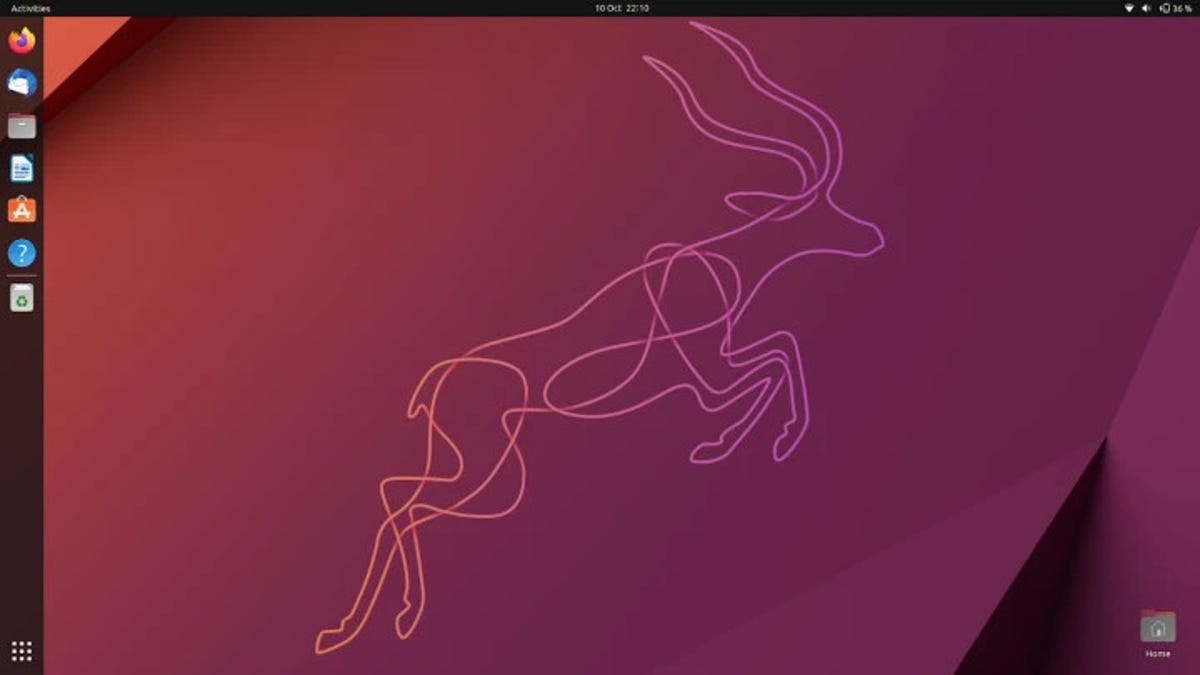Canonical releases Ubuntu 22.10 Kinetic Kudu

For business users and developers, Canonical’s recently introduced Ubuntu Pro, Amazon Web Services (AWS) virtual Ubuntu desktops, and, of course, its long-term support (LTS) version Ubuntu 22.04, are what you want. But, say you’re a programmer, and you want a leading-edge Ubuntu Linux. In that case, what you want is the brand-new Ubuntu 22.10, aka Kinetic Kudu.
In particular, Internet of Things (IoT) developers will find a lot to like in Ubuntu 22.10. As Mark Shuttleworth, Canonical CEO, said in a statement, “Connected devices are an exciting area of innovation that also create new digital risks in the home and the business. We are focused on enabling a new generation of easy-to-use and highly secure IoT so that these developers will find a number of quality-of-life improvements for embedded devices and remote development in Ubuntu 22.10.”
Also: Windowsfx may be the ideal Linux distro for Windows swtichers
In particular, Ubuntu 22.10 now has better support for the popular Raspberry Pi boards. This includes MicroPython support on many microcontrollers, including the Raspberry Pi Pico W. In addition, rshell, the thonny Integrated Development Environment (IDE), and mpremote are all available in the Ubuntu repositories.
The Ubuntu graphics stack now includes Kernel Mode Setting (KMS) graphics support. With this, developers can run Pi-based graphical applications using frameworks like Qt outside of a desktop session and without Pi-specific drivers. This also helps expand support for Raspberry Pi embedded displays such as the Inky eInk HAT series, Hyperpixel range, and the Raspberry Pi Official Touchscreen.
To reduce Ubuntu’s memory use on IoT devices, virtual machines (VM), and LXD containers, OpenSSH won’t start without an incoming connection request.
For more general developer support, the latest Ubuntu distro also supports the latest Ruby, Go, GCC, and Rust versions. Ubuntu 22.10 also comes with a new debuginfod service to help debug native programs. Debugging tools like gdb will automatically download the required debug symbols over HTTPS. For cloud developers, Ubuntu 22.10 also includes the latest OpenStack release, Zed,
Also: Even Linus Torvalds sometimes has PC problems
Under the hood, Ubuntu 22.10 is shipping with the new 5.19 Linux kernel. For desktop users, who I believe are the most likely to use the Ubuntu interim releases, the most important feature is the new futex_waitv() syscall. This can speed up games. It also now supports the Intel Advanced Matrix Extensions (AMX) instructions and the Intel Trust Domain Extensions (TDX).
Desktop users will also be pleased to see the latest version of GNOME 43 as Ubuntu’s default desktop. It also includes the common desktop programs refreshed, the Firefox 104 web browser, the LibreOffice 7.4 office suite, and the Thunderbird 102 e-mail client.
Ubuntu 22.10 also includes an updated system administration tool for simple Ubuntu server, desktop, and network infrastructure: Landscape 22.10 beta. With this, sysadmins can more easily run and manage Ubuntu on any architecture with monitoring, managing, patching, and compliance from server to desktop. With this new beta, you can also use Landscape Server on computers with Arm-based processors, including Ampere Altra-based ARM64 virtual machines on the public cloud and the RISC-V processors and Raspberry Pi, to simplify home administration.
For serious office work, I’m sticking with Ubuntu 22.04. But, for IoT developers and small business/home system administrators, the Kinetic Kudu has its place.
Related Stories:
For all the latest Technology News Click Here
For the latest news and updates, follow us on Google News.
